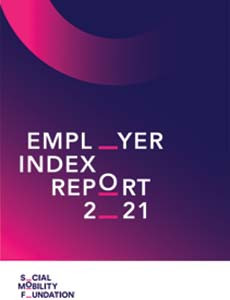*/

Fiona Fitzgerald shares Radcliffe Chambers' social mobility strategy, the only chambers to be featured in the Social Mobility Foundation’s Employer Index
To make a real impact on social mobility, you need to put it at the heart of your chambers. Manage it as you would any other strategy.
As a starting point, I would wholeheartedly recommend entering the Social Mobility Foundation’s Employer Index. Every organisation receives detailed feedback, and we have found this extremely helpful in focusing our efforts to improve year on year.
With the above in mind, it will come as no surprise that my first tip is to make sure that you have a proper plan. Set ambitious, but achievable objectives. One of our first was to organise an annual barrister experience programme for sixth-formers from underrepresented backgrounds. From there, we moved on to contextual recruitment, improving our pupillage marketing, and so on.
Make sure to agree on how you will measure the impact of your activities. Key performance indicators might be an increase in the diversity of candidates applying for pupillage, increased awareness of chambers among applicants, or an improved ranking on the Employer Index!
To achieve your objectives, you will need buy-in from staff and members of chambers. At Radcliffe Chambers, we were lucky that a significant number of us were already involved in social mobility activities such as mentoring, so we were pushing at an open door. However, we did need to reach more people and did so through a combination of awareness-raising and training.
If you are struggling to bring people with you, one point that always proves particularly persuasive is that clients want and expect the sets they instruct to be proactive in this area. It’s important to the brand of the Bar and when recruiting the best candidates. Indeed, I have had recent experience of clients emailing me to say how reassuring it was that we were so engaged.
You need a team of people to deliver large-scale projects like our sixth-form experience (which usually involves around a third of our chambers in a direct capacity). You will also need leaders. Find them and empower them to drive your strategy forward. We were lucky that Kate Selway QC was determined to get this project off the ground and make it a success. Well-run committees can help achieve this aim, but don’t underestimate individuals. Don’t forget that leaders can be found at all levels of seniority.
Getting the internal team right is important, but it is also really important to recognise where you don’t have the right experience and need to bring in external expertise. We have hugely increased our impact by collaborating with several outstanding organisations, including youth outreach charity BVL, RARE contextual recruitment and, of course, the Social Mobility Foundation. We have also greatly benefitted from working with Bridging the Bar, the Chancery Bar Association, and the Inns of Court, and with publications like The Times, Legal Cheek and Counsel Magazine, who have helped us publicise our work. We can achieve so much more when we all work together.
My final tip is to take a flexible approach. I mean this in two senses. The first is that things change. Social mobility is a fast-developing area and you need to be ready to update your strategy on an ongoing basis. For example, take account of recruitment best practice, such as contextual recruitment. The second is that it can be helpful to mix things up. By offering a broad range of ways that staff and barristers can promote social mobility, we have enabled more of our people to make a difference and increased Chambers’ overall impact. With options including joining a committee, becoming a mentor, helping with our sixth-form barrister experience, taking on mini-pupils and attending pupillage fairs, there is something that everyone can do, whatever their skills and availability.


To make a real impact on social mobility, you need to put it at the heart of your chambers. Manage it as you would any other strategy.
As a starting point, I would wholeheartedly recommend entering the Social Mobility Foundation’s Employer Index. Every organisation receives detailed feedback, and we have found this extremely helpful in focusing our efforts to improve year on year.
With the above in mind, it will come as no surprise that my first tip is to make sure that you have a proper plan. Set ambitious, but achievable objectives. One of our first was to organise an annual barrister experience programme for sixth-formers from underrepresented backgrounds. From there, we moved on to contextual recruitment, improving our pupillage marketing, and so on.
Make sure to agree on how you will measure the impact of your activities. Key performance indicators might be an increase in the diversity of candidates applying for pupillage, increased awareness of chambers among applicants, or an improved ranking on the Employer Index!
To achieve your objectives, you will need buy-in from staff and members of chambers. At Radcliffe Chambers, we were lucky that a significant number of us were already involved in social mobility activities such as mentoring, so we were pushing at an open door. However, we did need to reach more people and did so through a combination of awareness-raising and training.
If you are struggling to bring people with you, one point that always proves particularly persuasive is that clients want and expect the sets they instruct to be proactive in this area. It’s important to the brand of the Bar and when recruiting the best candidates. Indeed, I have had recent experience of clients emailing me to say how reassuring it was that we were so engaged.
You need a team of people to deliver large-scale projects like our sixth-form experience (which usually involves around a third of our chambers in a direct capacity). You will also need leaders. Find them and empower them to drive your strategy forward. We were lucky that Kate Selway QC was determined to get this project off the ground and make it a success. Well-run committees can help achieve this aim, but don’t underestimate individuals. Don’t forget that leaders can be found at all levels of seniority.
Getting the internal team right is important, but it is also really important to recognise where you don’t have the right experience and need to bring in external expertise. We have hugely increased our impact by collaborating with several outstanding organisations, including youth outreach charity BVL, RARE contextual recruitment and, of course, the Social Mobility Foundation. We have also greatly benefitted from working with Bridging the Bar, the Chancery Bar Association, and the Inns of Court, and with publications like The Times, Legal Cheek and Counsel Magazine, who have helped us publicise our work. We can achieve so much more when we all work together.
My final tip is to take a flexible approach. I mean this in two senses. The first is that things change. Social mobility is a fast-developing area and you need to be ready to update your strategy on an ongoing basis. For example, take account of recruitment best practice, such as contextual recruitment. The second is that it can be helpful to mix things up. By offering a broad range of ways that staff and barristers can promote social mobility, we have enabled more of our people to make a difference and increased Chambers’ overall impact. With options including joining a committee, becoming a mentor, helping with our sixth-form barrister experience, taking on mini-pupils and attending pupillage fairs, there is something that everyone can do, whatever their skills and availability.

Fiona Fitzgerald shares Radcliffe Chambers' social mobility strategy, the only chambers to be featured in the Social Mobility Foundation’s Employer Index


The Chair of the Bar sets out how the new government can restore the justice system
In the first of a new series, Louise Crush of Westgate Wealth considers the fundamental need for financial protection
Unlocking your aged debt to fund your tax in one easy step. By Philip N Bristow
Possibly, but many barristers are glad he did…
Mental health charity Mind BWW has received a £500 donation from drug, alcohol and DNA testing laboratory, AlphaBiolabs as part of its Giving Back campaign
The Institute of Neurotechnology & Law is thrilled to announce its inaugural essay competition
How to navigate open source evidence in an era of deepfakes. By Professor Yvonne McDermott Rees and Professor Alexa Koenig
Brie Stevens-Hoare KC and Lyndsey de Mestre KC take a look at the difficulties women encounter during the menopause, and offer some practical tips for individuals and chambers to make things easier
Sir Geoffrey Vos, Master of the Rolls and Head of Civil Justice since January 2021, is well known for his passion for access to justice and all things digital. Perhaps less widely known is the driven personality and wanderlust that lies behind this, as Anthony Inglese CB discovers
The Chair of the Bar sets out how the new government can restore the justice system
No-one should have to live in sub-standard accommodation, says Antony Hodari Solicitors. We are tackling the problem of bad housing with a two-pronged approach and act on behalf of tenants in both the civil and criminal courts